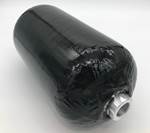NCC digital design trial speeds up composite pressure vessel proof of concept
Application of multi-disciplinary optimization (MDO) techniques determines optimal composite hydrogen pressure vessel design five times faster, says the NCC.

DETI hydrogen pressure vessel rendering. Photo Credit: National Composites Centre (NCC).
The National Composites Centre (NCC, Bristol, U.K.) has successfully completed a proof-of-concept project that demonstrates the transformative impact of digital tools on the design process for the complex engineering industry.
The application of multi-disciplinary optimization (MDO) techniques to a composite hydrogen pressure vessel has resulted in identifying an optimum design that is said to be five times faster than a traditional, sequential approach, in addition to reducing the risk of human error in the process of data transfer. Offering a new approach to redesigning and remaking sustainable products, the NCC says it enables increased agility and opportunities to innovate faster, driving competitive advantage and engineering leadership.
“We have demonstrated the potential efficiencies in product, process and productivity that can be achieved to accelerate digital engineering transformation,” Marc Funnell, director of digital engineering at the NCC, says. “Through DETI and Digital Engineering at the NCC, our proof of concepts and test beds help manufacturers to innovate, develop and de-risk rapidly configurable projects and industrial digital technologies before investment.”
Undertaken as part of Digital Engineering Technology & Innovation (DETI), a strategic program of the West of England Combined Authority (WECA), the project demonstrates the opportunity to address all design elements of a product at the same time, resulting in optimized design, lower development costs, faster new product introduction and the ability to refine specific features to meet contrasting demands of different applications.
HEEDS MDO, a design space exploration and optimization software from the Simcenter portfolio by Siemens Digital Industries Software (Plano, Texas, U.S.) was the platform selected for the implementation of the MDO process. Fifty designs were evaluated in less than two hours and an optimal solution was discovered among twenty-three feasible designs that satisfied all the constraint requirements.
The NCC says the proof of concept can be easily applied to other products and sectors, adapting the automated design process to quickly explore and optimize designs that address different objectives under a different set of constraints.
The NCC is part of a multi-partner collaboration called the Hydrogen Innovation Initiative (HII), which brings together the strengths and capabilities of the High Value Manufacturing Catapult Network and partner innovation centers to accelerate innovation, develop growth in the U.K. hydrogen supply chain and overcome technology and integration challenges to establish an effective U.K. hydrogen economy. This project in particular highlights the NCC’s credibility and expertise, delivering R&D and technology pull through from fundamental research to industrial application across four strategic areas: advanced composites, digital engineering, hydrogen and sustainability, to address complex global challenges.
More detailed information about the application of MDO to the hydrogen pressure vessel can be viewed in this accompanying case study.
Related Content
-
Toray announces growth, investment in carbon fiber composite materials
As part of its 2023-2025 management strategy, Toray projects 42% growth for pressure vessels, 30% growth in carbon fiber composite materials revenue and a doubling of capital investment.
-
ECOHYDRO project to enable recyclable composites for hydrogen storage
With the involvement of two schools from the Institut Mines-Télécom, the 4-year project aims to improve the intrinsic properties of a composite material based on Elium via four concrete demonstrators.
-
Honda begins production of 2025 CR-V e:FCEV with Type 4 hydrogen tanks in U.S.
Model includes new technologies produced at Performance Manufacturing Center (PMC) in Marysville, Ohio, which is part of Honda hydrogen business strategy that includes Class 8 trucks.
















